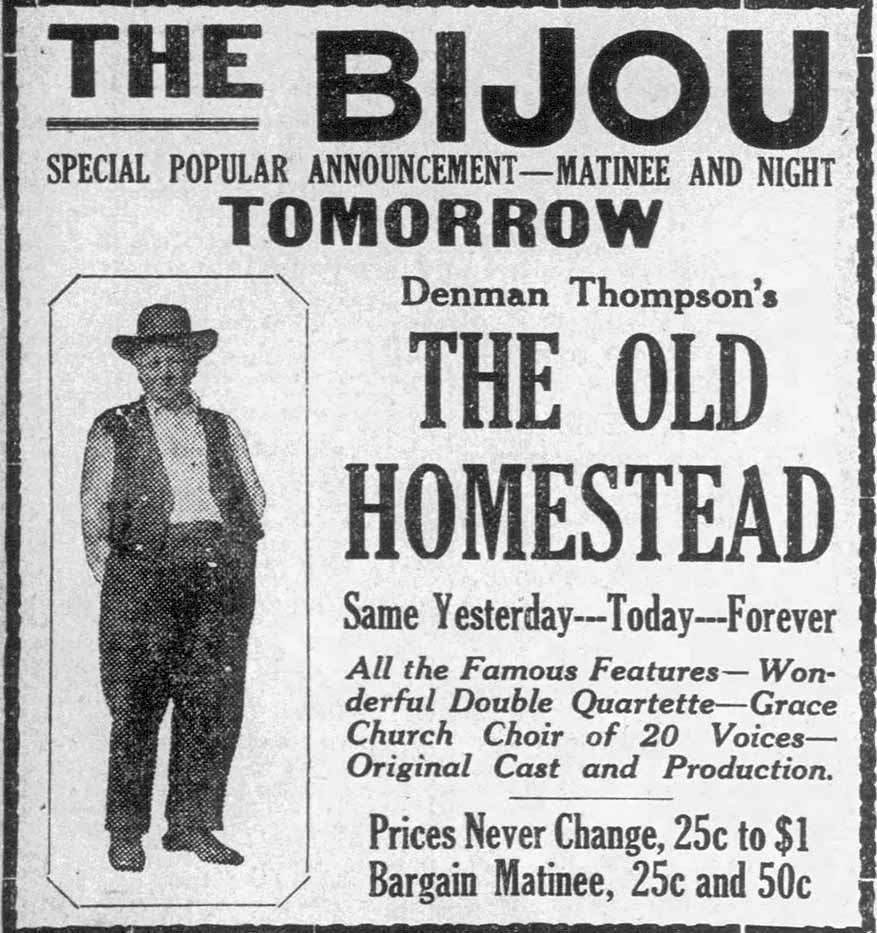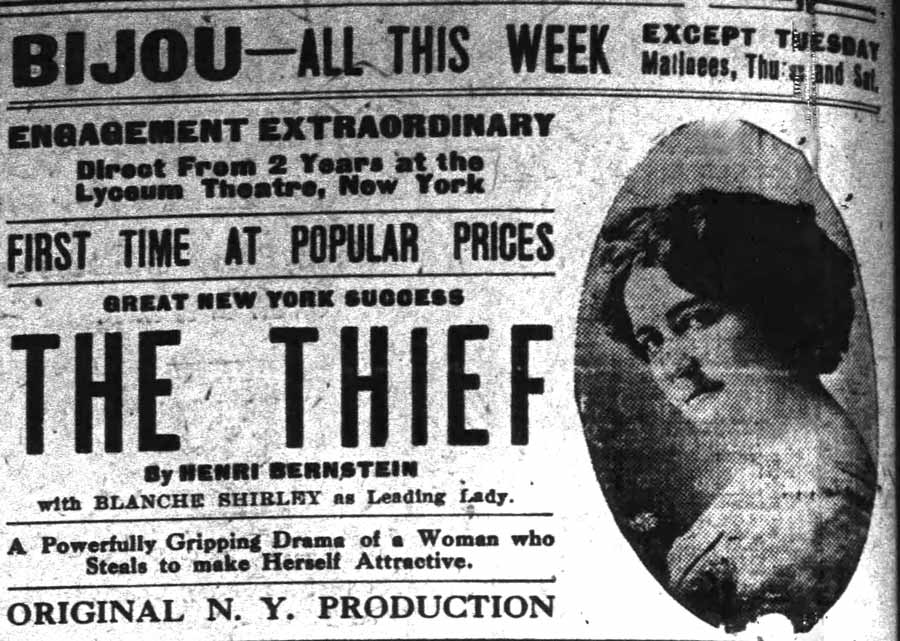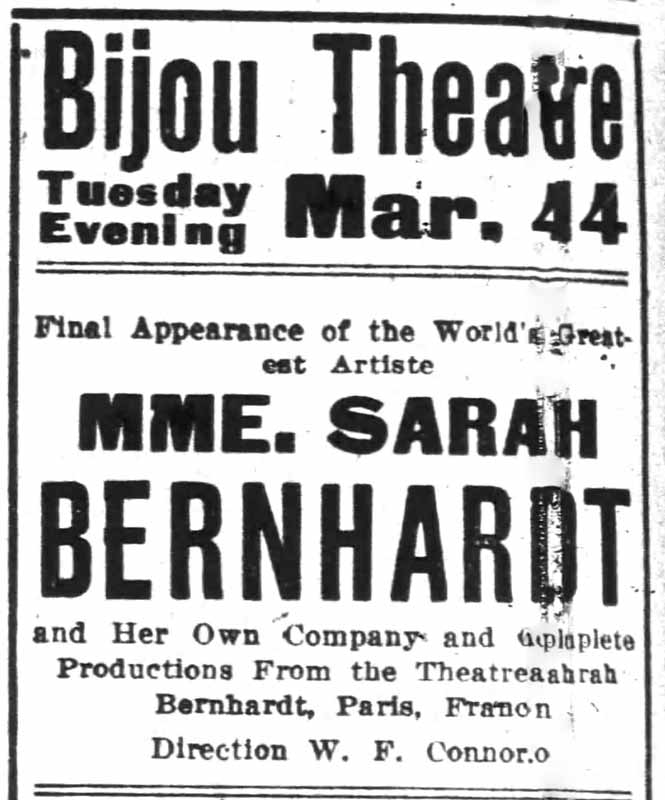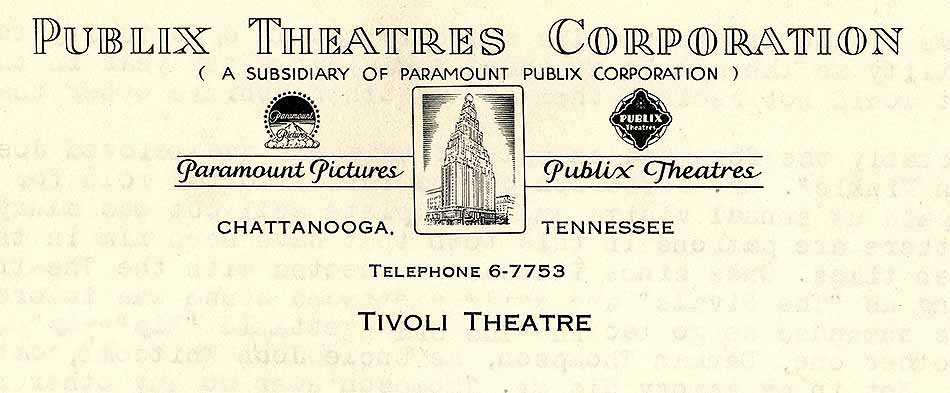CHAPTER ONE
I was born and lived in the city of Cleveland, Tennessee, until I was seventeen years of age. My parents were non-theatrical; in fact, they did not patronize the Theatre at all. [We] were all members of St. Luke's Memorial Episcopal Church that had been built and dedicated to Miss Nina Craigmiles, by her father, the late H. Craigmiles. He also built and owned the Craigmiles Opera House. My family and his were lifelong friends, and it was but natural that he often asked my sister and I to go to the shows with him. [Owning] the theatre, he would get passes to all the attractions that came our way, and my sister and I were tickled pink whenever he would ask us to share them with him. The Opera House was quite a nice building but so different from today. The floor was perfectly flat--not being ramped like the modern theatre and there was only one floor. No Balcony [or] Gallery. The Front curtain of the Stage rolled up instead of flying as they do now, and there was no such thing as drops but instead it was all flat scenery that worked in grooves in the floor and in the ceiling. In spite of its crudeness, many fine productions played there. No big extravaganzas or all-star casts but some very interesting and entertaining shows played our town, in fact more than one would suspect as Cleveland at that time boasted of only around 3,000 people. It was always an exciting event when the play-actors came to town, especially if there was a brass band with the company or if it was a minstrel company. This period was in the time when actors and actresses were frowned upon by our 'best' people and the mere mention of an actress' name brought a rise in the noses of our dear women folk and some very derogatory remarks. The average person in those days seemed to think an actor or actress was a disciple of the devil and one in which there could be no good.
To me they seemed to be creatures of another world--of supernatural as it were--and when I stood in their presence, I was awed by them and many times I had wished that I might travel all over the country as they did and be like them. Of course, I was looking only on the tinsel side of Theatrical life. Little did I know then that success in that business was attained only by hard work, self-sacrifice, and suffering and that only those possessed of great fortitude and perseverance could survive the hardships that go into the making of a star and artist.
I remember distinctly one company that played Cleveland for a three-day engagement. It was The Woodward-Warren Comedy Co. and was headed by H. Guy Woodward who played comedies, and his wife Bessie Warren who was the leading lady. The leading man, or Hero, as they were called then was none other than Charlie Middleton, a son of the late Mrs. Mary Middleton, of Chattanooga, and the Advance Agent ahead of the show was Bill Sharp, of Cleveland. Charlie Middleton is now in Hollywood working in pictures and has appeared in the support of many of the Screen's greatest stars, among them being the Late Will Rogers, the Late Marie Dressler, Harold Lloyd, Shirley Temple and many others. A peculiar co-incidence in Woodward's life was that he dropped dead while playing a Vaudeville Engagement at the Regent Theatre in Detroit, Michigan, and the spot where he fell was at the corner of Woodward and Warren Avenues. The names of streets being those of his and his wife. I was working at the Orpheum Theatre in Detroit at the time and had seen and talked to him a day or so before he died.
I will always remember the first show that I ever worked 'back-stage,' and that is really when and where the theatrical bug bit me hardest and inoculated me with a burning desire to adopt the theatre as a career. One day there came to Cleveland a company of actors and the vehicle they were appearing in was one of those very 'mellow' melodramas of rural life that were so popular in those days. It was that kind of show whose success depended on the amount of hisses the villain received and the amount of cheers the hero and heroine were accorded. This troupe carried a brass band and gave a free street parade. They were all dressed as rubes and during the parade they all scattered about the town, no two being together, yet they played in perfect unison and created quite a bit of comment. I was wild with excitement that day and hoped hope against hope that Mr. Craigmiles would ask sister and I to go with him that night but no such luck and I was beginning to lose all hope. However, I hung around the stage door all afternoon and in doing so happened to overhear one of the [company] ask the local stage manager or carpenter if he could get a couple of sheets, some pillows and a tablecloth to use in one of the scenes. [Here] was my golden opportunity--and I grasped it. I spoke right up with all the fervor of youth and said, "I'll get them for you," and was off before Mr. Duke could say no. After quite a bit of strategy on my part, I managed to purloin the aforesaid articles, for I knew it would never do to ask Mother [for] them for she did [not] lean very far toward things theatrical, so I quietly sneaked them out and over to the opera house as quickly as I could. As a reward for this service, I not only was allowed to see the show but was asked to help the stage manager work it. Oh boy, was I the proud thing. I was so excited I scarcely knew my name and could hardly wait until night came so I could begin my job.
The story of "Si Plunkard," for that was the name of the drama, had to do with the old familiar theme 'mortgage on the farm' which dad couldn't pay. You know the kind, where the villain, the village shylock, held the mortgage but was willing to 'tear up the papers' if the farmer's daughter would be his forever. The girl, of course, held no such thoughts but instead was deeply in love with a simple country boy, one poor in purse but rich in honor. We often see these plays burlesqued now-a-days and I sometimes [think] the burlesquing is not overdone for they seem so silly now and if they were played today as then I am sure the patrons would think us crazy to have enjoyed them as we did in the days now long gone. Well, the saving of the farm and the foiling of the villain carried you through two and a half hours of enthralling interest and brought hiss after hiss for the villain and cheer after cheer for the hero. Even in those days they had big spectacular effects and the piece-de-resistance of this drama was the big life-size threshing machine in full action at a threshing bee down on the farm. The climax came when the villain attempted to throw the girl who had spurned him into the maw of the big thresher but instead found himself thrown there by the hero and his trusting farm hands. It was thrilling in the extreme and literally chilled the blood in your veins.
It was my particular job to be the 'motor' or engine for this thresher and how thrilled I was to think I had such a responsible job that merely entailed turning a big crank that set in motion all the gears and gadgets that made the machine appear real and authentic. I was so excited and proud that I [clearly] forgot the tanning I was sure that I would get when I got home for taking those sheets and things without permission. But that didn't happen for I was so happy when I got home that I rather think Mother didn't have the heart to punish me.
From that time on, I hung around the opera house every time a troupe came to town hoping that something would turn up that I could help the stage carpenter with, and it usually did, for Mr. Duke took a liking to me and used me whenever he could and each new experience served only to fan the flames of desire for a theatrical career that were consuming me and it was only natural that when circumstances compelled us to remove to Chattanooga that I immediately turned all my interest to the Old Opera House, that was afterwards called the Lyric and which stood where the present Power Building now stands.













